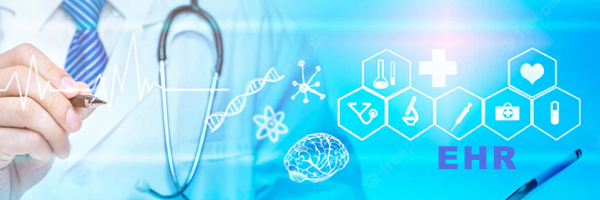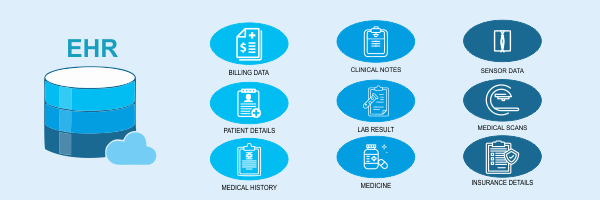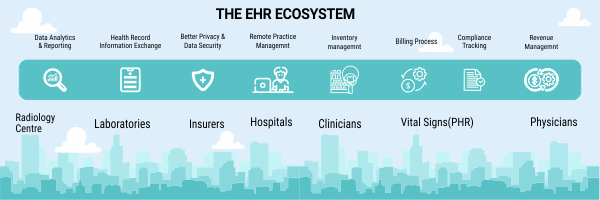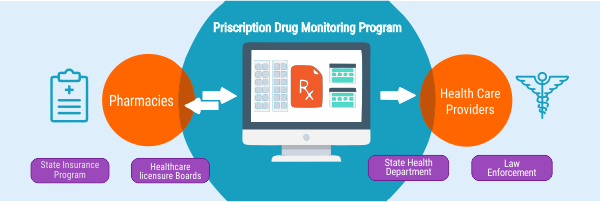
How EHR is transforming the healthcare sector?
In the medical industry, Electronic Health Records have gone a long way. They can, however, be upgraded to improve patient care and information accessibility.

Healthcare practitioners, from hospitals to primary doctors, have been carefully recording the health and treatment of their patients using medical records even before the invention of the computer and the concept of the electronic medical record.
Today's technological breakthroughs have made it possible to manage medical records electronically.
Medical practices may now function as paperless offices because of the ability to store and manage the electronic health record online, allowing them to streamline their daily activities and increase productivity.
Here in this blog, we will cover everything regarding Electronic health records, their market size, and how it is reshaping the idea of healthcare.
But first, let us tell you what is EHR in healthcare!
The Fundamentals of Electronic Health Records (EHR)
The digital version of the patient's paper record is called the Electronic Medical Record (EHR).
Electronic Health Records Software is patient-centered, real-time records that make information available to authorized users promptly and securely. Although the EHR system contains a patient's medical and treatment history, it is designed to go beyond traditional clinical data collected in the provider's office and may include broader inpatient care.

The EHR systems in healthcare are important aspect because they can:
- This file stores the patient's medical history, diagnosis, prescription, treatment plan, vaccination records, allergies, X-rays, and test and physical exam results.
- Allows physicians to access evidence-based tools to make decisions about treating patients
- The entire healthcare procedure can be automated and streamlined
One of the maximum vital traits of an EHR in healthcare is that legal physicians might also additionally produce and manipulate fitness facts in a virtual layout that may be shared with different docs throughout numerous fitness care organizations.
The Market Size of EHR in healthcare
For better patient care, electronic medical record systems are the ideal answer.
The importance of EHR in healthcare is becoming increasingly transparent as more patient data is digitized and more customers seek mobile access to health records.
According to an EHR article on appinventiv, over 75 percent of clinicians responded to the National Physician Survey in 2014 using EHR. In 2017, the number climbed by 5.3 percent, with 80.5 percent of hospitals opting for electronic health records.
In general, the EHR features and architecture have long been seen as a guaranteed way to improve medical care systems.
Here's what the future holds for electronic medical record systems and trends in 2022 and beyond, according to experts:
- According to a survey by medical economics, 87 percent of physicians are known to use an EMR or EHR system in 2017. The majority of customers who switched to EHR software did so because they sought functionality that their previous system lacked. The program no longer supported the new technologies, which is the second most prevalent cause. This might be due to the high switching costs associated with EMR adoption, causing consumers to maintain their software longer than the vendor updates it.
- By December 31, 2014, approximately 83 percent of physicians in the United States were utilizing EHRs, according to the HealthIT.gov dashboard. The usage of any EHR among office-based physicians has more than quadrupled from 2008 to 2021, from 42 percent to 86 percent.
- According to another poll, consumers spend USD 117.6K per year on EHRs, which is about USD 31.7K more than their annual budget. When it came to picking EHR software, people prioritized functionality above everything else. The ease of usage came in second. Given how critical a tool you use every day to make life-or-death decisions is, it's unsurprising that these are the respondents' top priorities. Price came in third place, owing to the fact that EMRs are notoriously pricey.
Given the facts and figures presented above, it's clear that EHRs will continue to improve in 2022 for both doctors and patients.
The law was meant to contain incentives and punishments for healthcare providers based on whatever system of medical record management they were using by 2015. This was done to encourage the broad usage and acceptance of electronic health records.

According to HITECH, medical practices that use EHR in medical terms could receive up to USD 44K per physician for covered Medicare patients and up to USD 65K over six years under Medicaid, whereas practices that failed to implement EHRs by 2015 would see their Medicare and Medicaid reimbursements for treating covered patients decrease.
While the move from paper medical records to electronic health records (EHRs) did not happen suddenly, their adoption and use have grown over time. However, as more healthcare providers adopt EHRs, many patients will be able to receive better-coordinated and higher-quality care.
A smooth transition between doctors and healthcare facilities, better medical care in emergencies, and a note of all test results and evidence, as everyone working in the clinic can access and view the patient's complete medical record - By doing so, it will be possible to improve medical prevention.
EHR and its role in enhanced healthcare
According to techpolicy institute , medical errors are estimated to cost at least $19.5 billion each year. While this figure is terrible in and of itself, when you add in the financial expenses of missed production, the total comes to $1 trillion. While this figure represents the cost to the nation as a whole, the expenses to your practice may be devastating if even a small percentage of this amount is lost due to squandered productivity.

Today, all sorts of health practices may increase efficiency and streamline their daily operations by using software, such as an EHR system, to aid with everyday operations and reduce the risk of costly medical errors.
Even though most doctors are aware of the numerous advantages of EHR. Keeping track of hundreds of thousands of patients by getting data from hundreds of different sources and paper charts is practically hard for large providers. Doctors must wait for most clinical data to reach them, however with an EHR, they may quickly access patient health information by providing a patient identification number.
Doctors may continue work with paper charts, but that would entail seeing and checking fewer patients every day, working late more frequently, making more medical errors, and spending more time in management.
Here are some of the most noteworthy benefits of electronic health records:
Collaboration has improved:
Doctor’s data can be easily shared, analyzed, and compared by specialists and other team members, reducing testing, reducing care costs, and improving results.
Artificial Intelligence has a track record of revolutionizing the healthcare business by assisting clinicians in analyzing past trends concerning a patient's condition and making a diagnosis.
That's why, with the aid of speech recognition technology, various firms are attempting to integrate AI into EHR.
For example, a clinician may use voice-enabled technology to query the EHR system about a patient's last reported iron levels from a blood test. The system will alert the physicians about the patient's health state when the orders are given.
Flexibility
Provides physicians with the ability to analyze tests, view results, submit prescriptions from outside the clinic, give physicians more freedom and accelerate patient care. Instead of waiting for a courier or rushing back to the office, doctors can access their information anytime, anywhere via a mobile phone, tablet, or desktop internet connection.
Using wizards and templates for speedier data entry, EHR assists you in quickly capturing patient notes.
Improving backend efficiency
EHR allows for more effective scheduling since appointments are controlled automatically, ensuring that doctors' time and efforts are maximized. Billing is handled automatically by making bills and automated invoicing, as well as sending invoices to specific patients through email.
Patient Engagement
Patients can use the patient site to access their records, track information, and make appointment requests. Patients receive vital appointments and billing reminders, which helps staff save time.
Quick and accurate decision-making
The EHRs assist physicians in making optimal judgments in clinical settings. We can notice certain mistakes and fix clinical judgments if we combine the capacity of clinical decision support with real-time involvement in sustaining public health.
Frequently, EHR systems send out an alert with a warning if a doctor prescribes medication that might be problematic for a patient with allergies. The healthcare business benefits greatly from EHR software's decision-making capabilities.
EHR may generate quality standards automatically to solve quality and security concerns. This makes it easier for healthcare professionals to control performance. EHRs may integrate with laboratories and offer data to public health organizations, in addition to boosting the capabilities of the healthcare system.
The widespread adoption of electronic health records has enhanced the healthcare system. EHRs are now being used by healthcare practitioners to recognize the benefits of population health management. EHR systems are accumulating a more useful set of data that can be accessed at any time and from any location.
How to adopt the Electronic Health Record System in healthcare?
Our world has been radically changed by digital technology. Smartphones, tablets, and connected devices have changed our daily lives and the way we communicate. Medicine is an information-rich company.
A larger, more seamless stream of information within the digital healthcare infrastructure created by Electronic Health Records (EHR) can embrace and leverage digital advances to transform the way care is delivered and refunded.

Health professionals are moving to technology and many providers and healthcare facilities are now using Electronic health record access. In 2017, 86% of practitioners used EPAs, according to a report from the National Coordinator of Health Information Technology.
8 Things to know about adopting EHR in healthcare
Social Constraints
In technology adoption studies, social influence refers to a person's perception that the majority of his or her key individuals believe he or she should utilize the new system. Social impact has been shown in several studies to be a crucial factor in physicians' acceptance of EHR. Physicians' judgments on EHR acceptance might be greatly impacted by their peers since they create norms via professional socialization and have a strong bond with other physicians.
Self-Efficacy of Computers
Computer self-efficacy refers to a person's assessment of his or her ability to use technology. Many studies have found that physicians' lack of expertise and familiarity with computer technology is a key barrier to EHR adoption and utilization.
Participation of Physicians
Participation of healthcare professionals in the design of the EHR or the implementation plan was cited in several studies as a factor in effective implementation. Physician engagement in the implementation phase was found to be highly linked with psychological ownership of the system research. This psychological ownership has a hugely beneficial impact on how valuable and easy to use the technology is seen. As a result, including physicians early in the EHR selection and implementation process may improve the system's value and usability.
Confidentiality Concern
The degree to which the physician feels that employing EHR might jeopardize the confidentiality of patients' information is referred to as confidentiality worries. Many studies have found that patient information confidentiality is a key barrier to physicians and other healthcare workers adopting EHR and e-health technology.
Investments
The initial investment and ongoing operational expenditures of adopting EHRs by physicians in small practices are two factors to consider. In many payment plans, the return on investment for an EHR technology in healthcare does not accrue to the provider in the short term. Savings from improved care quality and performance generally pass back to health insurers or payers in the form of lower service use.
Vendor Reliability Issues
Another major roadblock to certification has been vendor inconsistency since many early EHR firms have gone out of business or are in financial jeopardy. If a consistent data model and uniform standards were established throughout the industry, the adoption risk associated with vendor instability may be reduced.
In the event of a vendor failure, there would be switching fees, but the initial investment in creating the EHRs would not be wasted. Aside from the financial expenditures, system upgrades have a detrimental impact on physicians' workflows and productivity.
Privacy and Security
Security and privacy are significant considerations in the implementation of electronic health records, as well as primary issues in a healthcare setting. Physicians have a strong desire to keep their patient information safe so that it cannot be accessed without their authorization. Medical data is more reliable when it is kept private, and it is less likely to be misused by anyone.
Interoperability is a problem
Interoperability is a key issue in deciding whether or not to use EHR systems. Interoperability has the potential to decrease the workload for healthcare providers and facilitate the sharing and transfer of new medical knowledge among doctors. Interoperability is important because it lowers the cost of electronic health records and allows a single or small group of physicians to purchase and implement these systems.
Challenges of adopting Electronic Health Record
Yes, there are Pros and cons of HER in healthcare.
With the healthcare industry advancing at a breakneck rate toward technology, it's important to be mindful of the hazards that come with it.
Because they were exposed to the internet without any security mechanisms, these sorts of technology have been vulnerable to hackers in the past. Despite all of the potential benefits, physicians have difficult obstacles embracing EHRs.
Burnout in the Medical Field
Physical burnout is the most common problem in today's healthcare industry. According to studies, 50-60% of physicians have experienced burnout, which has resulted in poorer patient satisfaction, decreased patient safety, and more malpractice claims.
Because of its difficult-to-understand user interface, EHRs lead to physician burnout. To integrate data into EHR systems, a substantial amount of time is necessary. As a result, physicians do not have enough time to focus on patient communication.
As a result, the quality of patient treatment suffers, and physicians are more stressed and dissatisfied with their jobs. Furthermore, EHRs are reported to be a cost burden on both providers and practitioners in certain cases.
Interoperability
The capacity of EHR software to give data and information to other devices so that various users may access it is referred to as interoperability.
There are a lot of obstacles in the way of comprehensive interoperability adoption in the healthcare sector.
The problems spread to EHR systems, where obstacles in implementing electronic health records become a major concern due to a lack of interoperability across diverse systems. It is critical for the systems to interact well with one another to have a full picture of a patient's medical history.
Data communication in an EHR is frequently delayed due to a lack of interoperability between segments of the same EHR or between the EHR and another system. There may be instances where physicians are unable to access laboratories in an emergency or if a hospital patient's data are kept in a distant area of the hospital.
Building an interoperable framework that allows data to be shared among numerous providers remains a huge challenge for healthcare app development companies.
Lack of Training
Additional training is required for hospital employees about the EHR practice management platform and associated processes. It is critical to effectively teach users and staff before and throughout the deployment of EHRs to mitigate the issues associated with low productivity and to avoid a situation where users feel unsatisfied and irritated due to a lack of sufficient training.
Data Transfer
Moving from a paper-based system to an electronic system might result in data loss. Data input and document scanning might take a long time. The fundamental goal of switching to an electronic system is to transfer key information about patients' medical histories for future access, rather than to preserve all paper records.
Patient Acceptance
Practices often use a new approach to enhance their quality and service by including patients, which has been shown to significantly improve patient outcomes. However, no aim of boosting patient engagement can be reached unless and until patients are ready to accept EHR elements that increase patient engagement, such as the patient portal. As a result, patient adoption of EHRs is critical.
Conclusion
EHR may generate quality standards automatically to solve quality and security concerns. This makes it easier for healthcare professionals to control performance.
EHRs may integrate with laboratories and offer data to public health organizations, in addition to boosting the capabilities of the healthcare system. The widespread adoption of electronic health records has enhanced the healthcare system.
EHRs are now being used by healthcare practitioners to recognize the benefits of population health management. EHR systems are accumulating a more useful set of data that can be accessed at any time and from any location.
To know more about Electronic health records and their implementation in healthcare, follow us on our Instagram @percipeincesolutions and Facebook @percipience solutions channels, or get in touch with us at https://percipiencesolutions.com/contact
